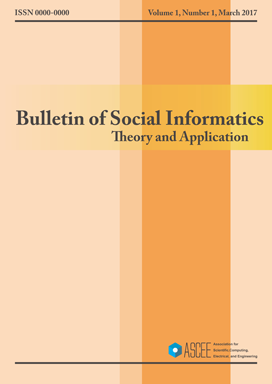Internship and Entrepreneurship in computer science
DOI:
https://doi.org/10.31763/businta.v7i1.206Keywords:
Entrepreneurial, Computer Science, Internship, StudentsAbstract
Graduated students of State University of Malang majoring in Computer Science have required to do an internship in industry. Generally, the chosen private industry is in the form of a startup such as learning media applications and games. In this case, the authors would like to conduct research related to the impact of an internship program and another Computer Science subject related to entrepreneurial skills. It is expected that this research can improve the quality of student graduates in order to have an entrepreneurial spirit.
References
V. Edgar and N. Jonathan, “Startup Ranking SAC,” 2019. Available at: https://www.startupranking.com/sac-wireless
K. Fredric, N. J. Lindsay, and S. Aviv, “Entrepreneurial orientation and international entrepreneurial business venture startup,” Int. J. Entrep. Behav. Res., vol. 14(2), pp. 102-117, 2008. doi : 10.1108/13552550810863080.
M. Zhou and H. Xu, “A Review of Entrepreneurship Education for College Students in China,” Adm. Sci., vol. 2(1), pp. 82-98, 2012. doi: 10.3390/admsci2010082.
G. Yi, “Impact of internship quality on entrepreneurial intentions among graduating engineering students of research universities in China,” Int. Entrep. Manag. J., pp. 1071-1087, 2017. doi : 10.1007/s11365-017-0491-2
J. Li, H. Matlay, and U. Kingdom, “Entrepreneurship education in China" , Educ. + Train., vol. 45, no. 8/9, pp. 495–505, Dec. 2003, doi: 10.1108/00400910310508883.
R. B. Moralista and G. C. Delariarte, “Entrepreneurship as a Career Choice : An Analysis of Entrepreneurial Self-Efficacy and Intention of National High School Senior Students at the Municipality of Calinog , Iloilo,” vol. 1, no. 2, pp. 12–15, 2014. Available at : http://apjeas.apjmr.com/wp-content/uploads/2014/05/APJEAS-2014-1-025.pdf
A. Tavakoli, “Impact of Information Technology On the Entrepreneurship Development,” vol. 7, no. 8, pp. 1421–1426, 2013. Available at: go.gale.com.
L. Chen and E. Claire, “IT Entrepreneurial Intention Among College Students : An Empirical Study,” vol. 24, no. 3, pp. 233–244, 2013. Available at : aisel.aisnet.org
M. Tatjana and M. Ljiljana, “The Invisible And Underestimated Contributions To Creative Achievements,” 30th Int. Sci. Conf. Econ. Soc. Dev., vol. 16(3), pp. 69-82, 2018. doi: 10.5937/megrev1903069m.
S. S. L. Chew, “Designers as Entrepreneurs: An Investigation on Why Startups Need Design and Design Need Startups,” Ohio State University, 2015. Available at: etd.ohiolink.edu.
R. Lisa, “Internships in start-up companies as part of an entrepreneurship education,” 2014. Available at: duo.uio.no.
U. Ekpoh and A. Edet, “Entrepreneurship Education and Career Intentions of Tertiary Education Students in Akwa Ibom and Cross River States, Nigeria.,” Int. Educ. Stud., 2011. doi: 10.5539/ies.v4n1p172
F. Wilson, J. Kickul, and D. Marlino, “Gender, Entrepreneurial Self-Efficacy, and Entrepreneurial Career Intentions: Implications for Entrepreneurship Education.,” Entrep. Theory Pract., 2007. doi: 10.1037/t22723-000.
M. Coco, “Internships: A Try before You Buy Arrangement,” SAM Adv. Manag. J., Vol. 65(2), pp.41 2000. Available at: go.gale.com
T. Susan, “Effects of college internships on individual participants,” J. Appl. Psychol., vol. 73(3), pp.393-401, 1988. doi: 10.1037/0021-9010.73.3.393
M. Mustofa, “Entrepreneurship Lecture and Entrepreneurial Behavior of Students of Sociology Education Study Program of Social Science Faculty UNNES 2018,” Int. Conf. Educ. Soc. Sci. Humanit., 2019. doi: 10.2991/icesshum-19.2019.66.
K. Daimi and N. Rayess, “The Role of Software Entrepreneurship in Computer Science Curriculum,” Int. Conf. Front. Educ. Comput. Sci. Comput. Eng., 2018. Available at: semanticsholar
S. Crawford and E. Boese, “ActionScript: a gentle introduction to programming,” J. Comput. Sci. Coll., vol. 21, no. 3, pp. 156-168, 2006. doi: 10.5555/1089182.1089203
G. Tesauro et al., “Managing Power Consumption and Performance of Computing Systems Using Reinforcement Learning,” pp. 1–8. Available at: neurips.cc.
A. Nugroho, Sunyoto, and U. Miftakhul, “Influence of internship toward entrepreneurship interest for mechanical engineering students,” AIP Conf. Proc., no. March, 2017, doi: 10.1063/1.4976920.
Downloads
Published
How to Cite
Issue
Section
License
Copyright (c) 2023 Muhammad Bahauddin Alfan, Sabri Sangjaya, Muhammad Rizal Rusdiansyah, Fandi M Arfabuma, Gulsun Kurubacak

This work is licensed under a Creative Commons Attribution-ShareAlike 4.0 International License.






